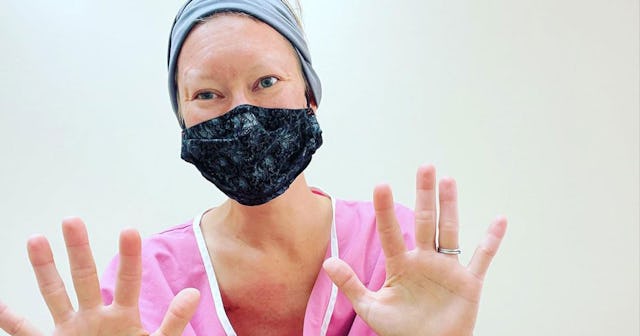I Talk About Boobs All The Time And I Don't Care If It Makes You Uncomfortable

I don’t intentionally talk about boobs all the time, but after all I’ve been through, I just can’t help myself. Bringing up mammograms, self-breast exams, breast implant illness, and cancer statistics is something I unconsciously work into every day conversations without a second thought to the comfort of the hearer.
I have certainly been told to lay off the breast talk — either discreetly or otherwise — and my response is this: If you are uncomfortable talking about breast health, think about how much more uncomfortable breast cancer is.
You might be wondering, isn’t it the pearl-clutching Karens who aren’t okay with a “feel it on the first” (that means, do your self breast exam the first of the month, every month) reminder? No. Everyday women, even those who consider themselves liberals, feminists, or body-positive, can get real squirmy when I bring up their melons.
When something traumatic happens to you, I have found that people typically have one of two responses. Either they wear their trauma on their sleeves or they work very, very hard to conceal it, push it down, and pretend it never happened. I’m not shaming those who aren’t like me, telling everybody and their mama about their trauma. I have personally found it healing and much easier to just “let it all hang out.”
I’m also an enneagram eight, which means confrontation is second nature to me. Again, I’m not imploring the lady behind me in the Target line to check her tits, but I’m not afraid to share that I’ve had breast cancer twice, especially if that lady makes a comment about my pink-ribbon tee. If she opens that door, I have no problem telling my story.
I was diagnosed with breast cancer when I was thirty-five years old. Previously, I’d had two breast lumps removed, both benign. I had “very dense” breast tissue, which means cancer could really easily hide, undetected, in my bosom. When I found a third lump, during a self-breast exam, I promptly saw my doctor who ordered a mammogram (my first) and ultrasound.
Both scans showed some masses in my breasts, but nothing concerning. I was told to come back in six months to repeat the scans. I was initially very relieved, of course. However, in the days that followed, my gut instinct told me something was wrong. I got in touch with a local breast surgeon. Upon examination, she agreed to do a biopsy.
My intuition was right. My third lump wasn’t “nothing” as the others were. Maybe the third time is an unlucky charm, because the mass was cancerous. I was initially diagnosed with stage 0 (yes, that’s a thing) breast cancer. After switching surgeons, an MRI, genetic testing, and seeing a plastic surgeon, I underwent a bilateral, direct to implant mastectomy. The pathology results — from my removed breast tissue — showed stage 1 breast cancer.
I thought I’d put cancer behind me and spent the next three and a half years working on my mental and physical health. I was so excited to be closer to the five-year-cancer-free mark when, last fall, I pulled up my slouchy v-neck shirt and felt something in my chest wall. A few months later, after multiple scans and a biopsy, I was diagnosed with breast cancer, again.
The past eight months has been a torturous whirlwind of surgeries, scans, twelve rounds of chemotherapy, thirty-three rounds of radiation, and many appointments. I am very grateful for my second chance, but I’m so tired and traumatized.
To me, it doesn’t make any sense that women will readily admire sexy celebrities and watch near-nude TikToks, but if I dare to bring up their boob health, they backpedal. It simply doesn’t make sense to gaze at someone else’s fabulous bod without taking care of one’s own jugs.
Not having cancer is what’s really sexy — and important. Early detection, now that’s lit. We can only detect what we test for. Self-breast exams are one way we can check out the twins. Then there’s mammograms, ultrasounds, and medical breast exams, performed by a doctor. If a person has a family history of certain cancers — including breast cancer — genetic testing can be helpful in determining future risk.
If you’re like me, I send my friends social media posts throughout the week — videos that make me laugh, mommy memes, GIFS — you name it. However, it’s more important to remind my friends on the first of every month to check their boobs and remind others to do the same. If we can readily share a celebrity pic or a funny video, we need to care enough about others’ existence to remind them that one in eight women will get breast cancer in her lifetime. (See what I did there? Sliding some boob talk right into this conversation.)
Most breast cancer patients don’t have a family history. Some breast cancer patients, like me, were young at diagnosis, long before we are told to have an annual mammogram. Breast cancer doesn’t care your age, race, religion, income level, orientation, gender, sex, or how busy you are. It shows up like something fierce and starts destroying. The earlier you know something is amiss, the better.
I won’t stop boob-talk, because not enough people are talking about it. If my boobie convo prompts only one person to do their self-exam, schedule their mammogram, or get their genetic testing done, it’s worth all the squirmy reactions I get. Cancer isn’t a warm and fuzzy conversation. In fact, it’d downright horrifying. I would know. My goal is to save another woman — or as many will listen — from dealing with the same beast.
This article was originally published on